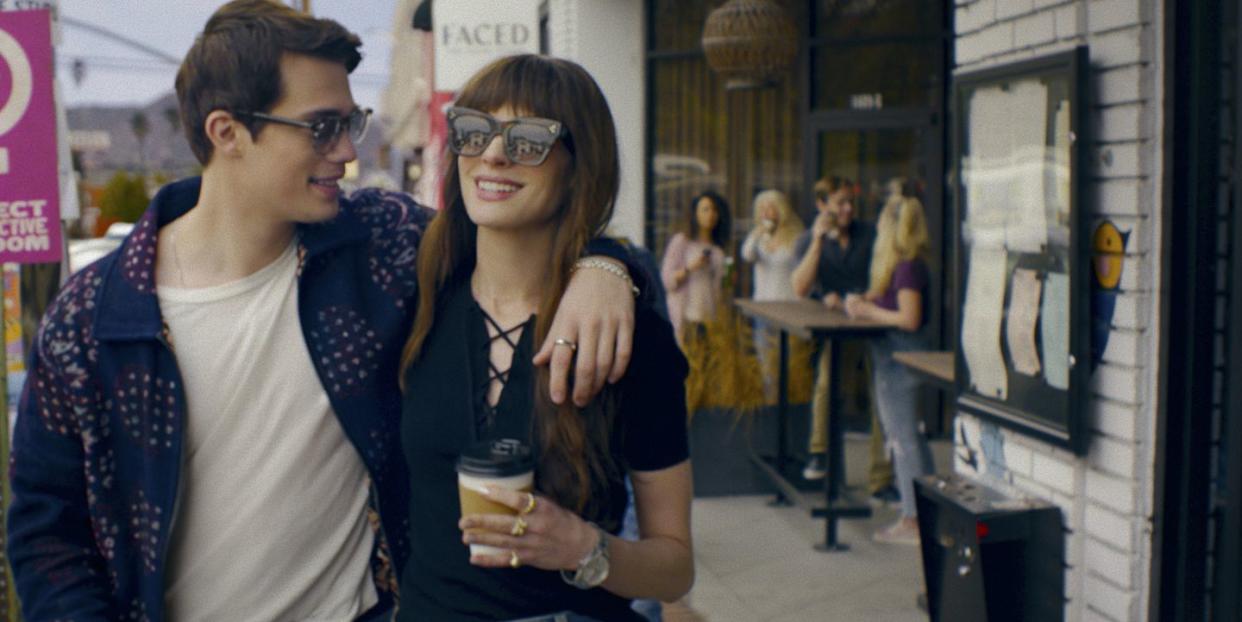Why are we still so judgemental of age-gap relationships?

As The Idea of You – the new Anne Hathaway-starring romcom based on, er, Harry Styles fanfic – arrives on Amazon Prime, everyone’s favourite debate has reentered the group chat: age-gap relationships.
For those who didn’t watch the film the minute it dropped, The Idea of You is an adaptation of a novel of the same name by Robinne Lee. The story follows Solène Marchand (Anne Hathaway), a 40-year-old mother and divorcée, who falls in love with pop star Hayes Campbell (Nicholas Galitzine), the 24-year-old lead singer of a famous band called August Moon, after the pair meet when Solène takes her daughter Izzy (Ella Rubin) to Coachella.
No spoilers here, so you’ll have to watch the film to find out how the relationship turns out, but the couple’s 16-year age gap has, once again, got people furiously debating what exactly an ‘acceptable’ age gap is.
We’re not asking that, though. What we want to know is: In an era of online dating, celebrating kink and gender fluidity, why do we continue to be so obsessed with a couple’s respective ages remaining in an ‘acceptable’ gulf? And what even is deemed acceptable when we’re talking about romance and desire?
Age-gap relationships (sometimes referred to as May-December relationships – yes, like the film) are of course nothing new. They’ve existed throughout history: from Cleopatra VII and Julius Caesar’s 30-year age gap, to the 12 years between King Charles and Princess Diana. Still, we continue to get hung up over them, questioning the intentions of those involved and placing our own preconceived ideas upon couples in the public eye.
We’ve seen this play out with celebrity couples several times over. In 2020, Florence Pugh, now 28, posted a video to Instagram to publicly address criticism and trolling that she had been on the receiving end of for dating her then-partner Zach Braff, who’s now 49. The couple’s 21-year-age gap took so many by surprise that Pugh said: “I do not need you to tell me who I should and should not love,” adding that, “really it has nothing to do with you.” What fans saw as being protective of their idol, Pugh herself saw as “cyberbullying”.
Likewise, with Kim Kardashian, 43 and then-boyfriend Pete Davidson, 30, the internet was quick to react to their 13-year age difference. Still, Kim just briefly addressed her age gap with Pete with E News saying: “If it’s older, younger, doesn’t even matter. But younger... I’m not mad at it.”
Cher, who’s 77, also recently addressed the 40-year age gap between her and her partner Alexander “A.E” Edwards, 38. After she hard-launched him back in 2022, fans flooded her replies with divided opinions. But Cher was quick to clap back. “Anytime you make a choice you take a chance. I’ve always taken chances… it’s who I am.” She added: “I’m not defending us. Haters are gonna hate… doesn’t matter that we’re happy and not bothering anyone.”
Criticism or concern?
While piling on is never okay, there is an understandable concern coming through some of this kind of commentary. Of course, we feel close to celebrities, and can feel protective of them (especially when we’ve seen women sold out and treated badly by their respective industries for various reasons – free Britney forever!). And of course, historically, there’s enough to make us hesitant to celebrate a man dating a woman so much younger than him. Issues of consent, as well as economic and power imbalances, are all serious considerations – and these are issues we’ve seen addressed and called out since #MeToo.
“In some relationships where there is a significant age gap between partners, for example 10 years or more, there may be unique problems the couple can face, including power imbalances,” Dr Daria J. Kuss, Associate Professor in Psychology explains to Cosmopolitan UK. “In some cases, coercion and financial control may be a reason for confrontation. Age may make younger partners more vulnerable with regards to being more dependent on the older partner,” she says.
Studies have shown that couples who are similar in age are more likely to last because they will essentially be in similar stages in life, which researchers say is possibly explained by “differently-aged couples [being] less resilient to negative shocks compared to similarly-aged couples”.
However, as Kuss explains, age isn’t always an indication of personality or life experience. “Levels of maturity are not always tied to age, and the reverse may be true in such a way that the younger partner is the more mature one,” she says.
Likewise, other studies have even found that there is a reported high relationship satisfaction in age-gap couples in comparison to similar-age couples despite being prone to social disapproval due to potential exploitation. The same is true for same-sex couples (although little data is known about how an age gap affects the dynamic in LGBTQ+ relationships).
And, remember, if we’re talking about celebrities – what binds them together more: the experience of not being a mere mortal, having a legion of fans, and being super-rich, or the girth of age? Sharing the absurdity of fame feels much more like the thing they’ll be bonding on, to us.

One rule for him…
We might be able to accept that two people are in a consensual, happy relationship, but our general understanding of gender dynamics and bias are also at play. While issues of consent and power are a serious concern, these can take place in any relationship, no matter the age gap.
“In society, it’s viewed as ‘normal’ for a man to be in a relationship with a woman several years younger. In contrast, it’s often frowned upon when it’s the other way around, and people can be very quick to judge,” says dating coach James Preece.
Anecdotally, it does often appear that the backlash hits women in heterosexual relationships hardest. In the celebrity world, Leonardo Di Caprio’s (49) penchant for women in their 20s has long been the butt of jokes (there’s even a chart mapping the age of his recent partners). People are also more likely to buy into the ‘gold digger’ and ‘sugar baby’ stereotypes with these relationships. And when a woman dates a younger man, she often finds herself at the receiving end of nastier commentary, labelled a ‘cougar’ seeking a ‘toy boy’, a ‘cradle-snatcher’, or a ‘M.I.L.F”.
Despite this, online daters are increasingly interested in meeting someone outside of their age bracket. According to a study published in the Journal of Sex Research, women reported high levels of sexual pleasure and satisfaction within these intimate partnerships with younger men. Tinder has also found that nearly half (45%) of female Tinder members globally have matched someone younger, and mentions of ‘younger man’ have increased by 70%.
“Motivation to date can be difficult when the woman is much older than the man. While there are plenty of genuine guys who would value and appreciate this, there are some who see it as novelty,” Preece explains. Although there’s been efforts to reclaim these terms to describe a woman who is sexually liberated, the gender norms persist.
Happily ever after?
So, should we be worried about age differences in dating or is age really just a number? It was never going to be that simple was it! “Age-gap relationships can certainly work, but they are more difficult to sustain than ones where the age difference is smaller,” Kuss claims. “This is partly because when people are at different life stages, their priorities will be different.”
Kuss also explains that communication and managing expectations can be different for age-gap relationships compared to similar-aged couples. “The older partner in the couple may have their life already established, while the younger partner may find themselves in a period of self-discovery. There may be different opinions on family planning and fertility. In addition, the older partner may be more financially secure, which can lead to finance-driven problems within the couple.”
Preece emphasises the importance of being intentional when dating regardless of whether there’s an age gap or not. “Date anyone who fits other more important criteria such as value and interests,” he advises. “If you are both willing to work hard at the relationship, and stop caring what others think, you have a good chance of making it last. As long as you both make each other happy, then you should do what feels right for you.”
You Might Also Like

 Yahoo Lifestyle
Yahoo Lifestyle 
